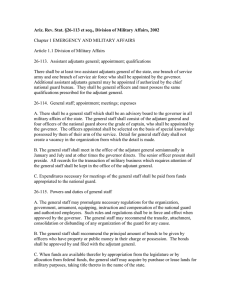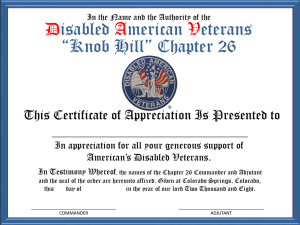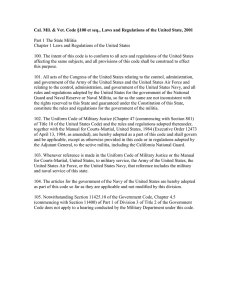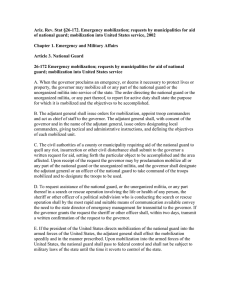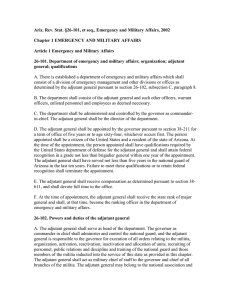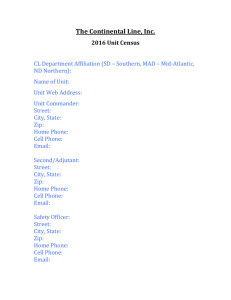Cal. Mil&Vet. Code §120 et seq.doc
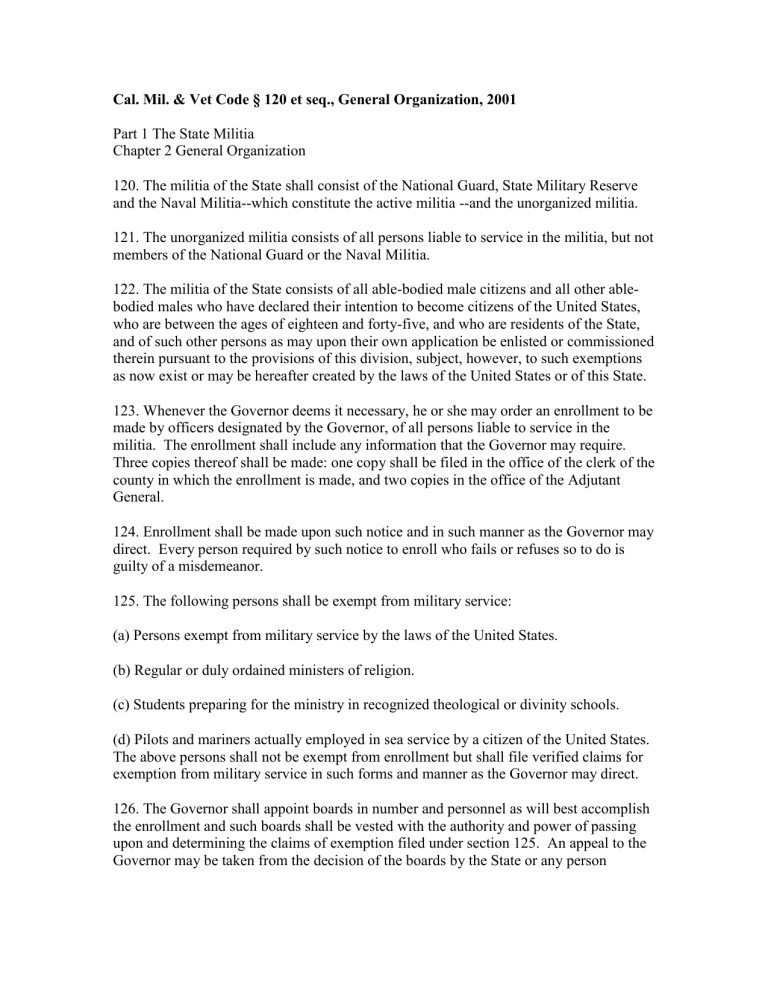
Cal. Mil. & Vet Code § 120 et seq., General Organization, 2001
Part 1 The State Militia
Chapter 2 General Organization
120. The militia of the State shall consist of the National Guard, State Military Reserve and the Naval Militia--which constitute the active militia --and the unorganized militia.
121. The unorganized militia consists of all persons liable to service in the militia, but not members of the National Guard or the Naval Militia.
122. The militia of the State consists of all able-bodied male citizens and all other ablebodied males who have declared their intention to become citizens of the United States, who are between the ages of eighteen and forty-five, and who are residents of the State, and of such other persons as may upon their own application be enlisted or commissioned therein pursuant to the provisions of this division, subject, however, to such exemptions as now exist or may be hereafter created by the laws of the United States or of this State.
123. Whenever the Governor deems it necessary, he or she may order an enrollment to be made by officers designated by the Governor, of all persons liable to service in the militia. The enrollment shall include any information that the Governor may require.
Three copies thereof shall be made: one copy shall be filed in the office of the clerk of the county in which the enrollment is made, and two copies in the office of the Adjutant
General.
124. Enrollment shall be made upon such notice and in such manner as the Governor may direct. Every person required by such notice to enroll who fails or refuses so to do is guilty of a misdemeanor.
125. The following persons shall be exempt from military service:
(a) Persons exempt from military service by the laws of the United States.
(b) Regular or duly ordained ministers of religion.
(c) Students preparing for the ministry in recognized theological or divinity schools.
(d) Pilots and mariners actually employed in sea service by a citizen of the United States.
The above persons shall not be exempt from enrollment but shall file verified claims for exemption from military service in such forms and manner as the Governor may direct.
126. The Governor shall appoint boards in number and personnel as will best accomplish the enrollment and such boards shall be vested with the authority and power of passing upon and determining the claims of exemption filed under section 125. An appeal to the
Governor may be taken from the decision of the boards by the State or any person
interested in the matter and within the time prescribed in regulations promulgated by the
Governor.
127. When the National Guard and Naval Militia are on duty as a combined force at any time, the commanding officer of the whole force shall be designated by the Governor.
When two or more officers are on duty in the same place, camp, field, command or organization, the Governor may assign the command to any one of such officers without regard to seniority of rank or branch of service.
128. The unorganized militia may be called for active duty in case of war, rebellion, insurrection, invasion, tumult, riot, breach of the peace, public calamity or catastrophe, or other emergency, or imminent danger thereof, or may be called forth for service under the
Constitution and laws of the United States. Whenever it is necessary to call out any portion of the unorganized militia, the Governor may call for and accept as many volunteers as are required for such service, under regulations provided by this division.
129. Every member of the militia who is ordered out, or who volunteers or is drafted under the provisions of this division and who does not appear at the time and place designated by the Governor, or under his authority, within twenty-four hours from such time, and who does not produce a sworn certificate of physical disability from a physician in good standing, is a deserter and shall be dealt with as prescribed in the
Articles of War of the United States, or by this division.
130. Members of the militia of the state shall not be segregated on the basis of race, national origin or ancestry, or color, nor discriminated against on such basis in enlistments, promotions, or commissions. It is hereby declared to be the policy of the
State of California that there shall be equality of treatment and opportunity for all members of the militia of the state without regard to race, national origin or ancestry, or color. Such policy shall be put into effect in the militia by rules and regulations to be issued by the Governor with due regard to the powers of the federal government which are, or may, be exercised over all the militia of the state, and to the time required to effectuate changes without impairing the efficiency or morale of the militia.
140. The Governor of the State, by virtue of his office, is the Commander in Chief of the
Militia of the State.
141. The staff of the Governor consists of The Adjutant General and such aides as the
Governor designates from the personnel of the National Guard and Naval Militia to serve during his incumbency. Such staff may also include the following personal aides-decamp: five aides-de-camp who may be appointed by the Governor and who shall have the rank of lieutenant colonel, and one naval aide with the rank of commander. Such appointments by the Governor shall operate as a commission of such aides-de-camp.
142. The Governor may order the active militia or any portion thereof to perform military duty of every description, including necessary administrative duties, and to participate in small arms gunnery competitions in this State or in any other state or territory or the
District of Columbia, or in any fort, camp, or reservation of the United States. He may also authorize the performance of military duty or participation in small arms or gunnery competitions by any part of the active militia anywhere without the State or without the
United States. Cruise duty ordered for the Naval Militia may be required to be performed on United States vessels.
143. Whenever the Governor is satisfied that rebellion, insurrection, tumult or riot exists in any part of the state or that the execution of civil or criminal process has been forcibly resisted by bodies of persons, or that any conspiracy or combination exists to resist by force the execution of process, or that the officers of any county or city are unable or have failed for any reason to enforce the laws, the Governor may, by proclamation, declare any part of the State of California or the county or city or any portion thereof to be in a state of insurrection, and he or she may thereupon order into the service of the state any number and description of the active militia, or unorganized militia, as he or she deems necessary, to serve for a term and under the command of any officer as he or she directs.
144. The Governor may at any time revoke a proclamation of insurrection or declare that it shall terminate at a time or in the manner that he or she directs.
145. A person who, after publication of the proclamation authorized by Section 143, joins, participates or takes any part in a rebellion, insurrection, tumult or riot, or who is party to any conspiracy or combination to resist by force the execution of the laws or who resists or aids in resisting the execution of process in any county or city declared to be in a state of insurrection, or who aids or attempts the rescue or escape of another from lawful custody or confinement, or who resists or aids in resisting any force ordered out by the Governor to quell or suppress an insurrection, is punishable by a fine of not less than one thousand dollars ($1,000), or by imprisonment in the state prison not less than two years or in a county jail not exceeding one year, or by both such fine and imprisonment.
146. The Governor may call into active service any portion of the active militia as may be necessary, and if the number available be insufficient, the Governor may call into active service any portion of the unorganized militia as may be necessary, in any of the following events:
(a) In case of war, insurrection, rebellion, invasion, tumult, riot, breach of the peace, public calamity or catastrophe, including, but not limited to, catastrophic fires, or other emergency, or imminent danger thereof, or resistance to the laws of this state or the
United States.
(b) Upon call or requisition of the President of the United States.
(c) Upon call of any United States marshal in California, or upon call of any officer of the
United States Army commanding an army, army area, or military administrative or tactical command including generally the State of California, or upon call of any officer
of the United States Air Force commanding an air force, air defense force, air defense command or air command including generally the State of California.
(d) Upon call of the chief executive officer of any city or city and county, or of any justice of the Supreme Court, or of any judge of the superior court, or of any sheriff, setting forth that there is an unlawful or riotous assembly with intent to commit a felony, or to offer violence to person or property, or to resist the laws of the State of California or the United States or that there has occurred a public calamity or catastrophe requiring aid to the civil authorities.
(e) Upon call of the sheriff setting forth that the civil power of the county is not sufficient to enable the sheriff to execute process delivered to him or her.
147. In case of insurrection, invasion, war, rebellion, tumult, riot, breach of the peace, public calamity or catastrophe, or imminent danger thereof, or in the event of emergency in which all or any part of the militia is actively engaged in service upon order of the
Governor, the Governor may suspend any and all provisions of this division or other laws of the State which require advertisement for bids for purchases of supplies or employment of services.
148. The Governor may make rules and regulations in conformity with this code which shall conform as nearly as practicable to those governing the United States Army, United
States Air Force and United States Navy. Such rules and regulations shall have the same force and effect as the provisions of this code. A finding by the Governor that it is impracticable to conform rules and regulations to those governing the United States
Army, United States Air Force or United States Navy shall be conclusive and such rules and regulations shall have force and effect over inconsistent rules, regulations, directives, manuals or practices governing any of the armed forces of the United States.
160. The Adjutant General is chief of staff to the Governor, subordinate only to the
Governor and is the commander of all state military forces.
160. 5. Any statute of this state referring to the Commanding General of the State
Military Forces is deemed to refer to the Adjutant General.
161. The office of the Adjutant General consists of one officer of the rank of lieutenant general who is the Adjutant General, one officer of the rank of brigadier general who is the Assistant Adjutant General, one officer who may be of the rank of brigadier general who is the Deputy Adjutant General, Army Division, one officer who may be of the rank of brigadier general who is the Deputy Adjutant General, Air Division, one officer who may be of the rank of brigadier general who is the Deputy Adjutant General, Joint Staff
Division, and other officers as are prescribed by the laws or regulations of the United
States. No person is eligible for appointment as the Assistant Adjutant General unless he or she had not less than a total of five (5) years of commissioned service in the National
Guard of the United States, of which at least three (3) years shall be service as a field grade officer in the California National Guard within the preceding 10-year period prior
to the date of appointment and of which at least three (3) years shall have been in command of Army or air troops at the battalion or equivalent or higher command level or three (3) years as a staff officer at brigade or equivalent or higher staff level. The
Assistant Adjutant General is subordinate only to the Governor and the Adjutant General.
162. The Adjutant General shall be appointed by the Governor with the advice and consent of the Senate, and shall hold office at the pleasure of the Governor, or until his successor is appointed and has qualified. No person is eligible for appointment as
Adjutant General unless he had not less than a total of ten (10) years of commissioned service in the National Guard of the United States, of which at least four (4) years shall be service as a field grade officer in the California National Guard within the preceding
10-year period prior to the date of appointment and of which at least four
(4) years shall have been in command of army or air troops at the battalion or equivalent or higher command level or four (4) years as a staff officer at brigade or equivalent or higher staff level.
163. The Adjutant General shall perform such duties as are prescribed in this code and such additional duties consistent with the regulations and customs of the United States
Army, United States Air Force, and the United States Navy as may be prescribed by the
Governor. He shall issue all orders in the name of the Governor.
163. 1. All records of any special proceedings of any board of inquiry convened by the commanding general of the state military forces to investigate the causes of any accidents involving National Guard aircraft, the purpose of which investigation is prevention of future accidents, shall not be admissible for any purpose in evidence in any court of this state. Whenever any such accident involves property damage or personal injury, a collateral investigation shall be conducted to ascertain the causes of such accidents and the records of any collateral investigations shall be discoverable under the appropriate sections of the Code of Civil Procedure.
164. Subject to the approval of the Department of Finance, the Adjutant General shall appoint and fix the salaries of all clerical, expert, and technical assistants necessary for the proper conduct of his office. In general, the Office of the Adjutant General shall be organized according to general staff doctrine and procedure as set forth by the
Department of the Army and the Department of the Air Force regulations where the same are not inconsistent with the laws of the State of California or this code.
164. 1. The Adjutant General shall be paid the same pay and allowances as is received by a lieutenant general in the Army of the United States and shall be paid in the same manner and at the same time as other state officers.
166. In the event of the absence of The Adjutant General or of his inability to perform his duties, the officer designated by The Adjutant General or the senior officer in The
Adjutant General's office shall perform the duties of The Adjutant General. In the event
of the absence or inability of such officers the Governor may detail a National Guard officer to perform such duties.
167. (a) All commissioned and warrant officers and enlisted personnel on permanent active duty with the Office of the Adjutant General shall be appointed by the Governor, with consideration of the recommendation of the Adjutant General and, except for the
Adjutant General, the Assistant Adjutant General, and officers assigned to general officer positions, may remain on active duty with the office either until age 60 or until federal recognition of grade or rank as a member of the California National Guard is withdrawn, whichever occurs later.
(b) If the commission of an officer on active duty with the office is vacated pursuant to
Section 232, if a warrant officer on active duty with the office is discharged pursuant to
Section 225, or if an enlisted person on active duty with the office is discharged under proper authority, the provisions of subdivision (a) regarding retention until age 60 do not apply.
(c) A commissioned officer on active duty with the office assigned to a general officer position who, previous to that duty, held a permanent active duty position in the office at a lower grade may revert to the permanent grade last held upon vacation of the general officer position.
168. The duties of the officers of the Office of the Adjutant General shall be such as are prescribed by law and regulations and shall conform as closely as practicable to the duties prescribed by orders and regulations of the Department of Defense for like officers in the
United States Army, United States Air Force and United States Navy. The Assistant
Adjutant General shall be a brigadier general and shall receive the same pay and allowances as a brigadier general in the United States Army.
169. The Adjutant General shall attest commissions issued to military officers.
170. The seal now used in the Office of the Adjutant General is the seal of that office, and shall be delivered by the Adjutant General to his or her successor. All orders issued from the Office of the Adjutant General shall be authenticated with this seal. Any order or directive inadvertently or mistakenly made or entered in the Office of the Adjutant
General may for good cause and a reasonable time be vacated and set aside by the
Adjutant General and a proper and correct order or directive made and entered in lieu thereof.
171. The Adjutant General shall keep a register of all the officers of the militia of the
State and shall keep in his office all records and papers required to be kept and filed therein.
172. The Adjutant General shall make a report to the Governor every fourth year, commencing in 1963, the report to include a statement of the moneys received and disbursed by the Adjutant General for military purposes, the number and condition of the
active militia, and a history of the activities and developments of the Military Department during the preceding four years.
173. The Adjutant General shall, at the expense of the State, when necessary, cause the military law, general regulations of the State, Articles of War of the United States, a history or histories of the California National Guard or the units thereof, and such other military publications necessary for the military service to be printed, indexed, and bound in compact form and distributed to the commissioned officers, and the several organizations of the active militia, and to such other military personnel and organizations as the Adjutant General may find to be necessary.
174. The Adjutant General shall cause to be prepared and issued all necessary blank books, blanks, and notices required to carry into full effect the provisions of this division.
All such books and blanks are the property of the State.
175. In order that the active militia of the State may receive the funds provided by
Congress, the Adjutant General shall prepare and submit a plan of proposed field or camp service of instruction for the ensuing year, with an estimate of the funds required for pay, subsistence, and transportation of the portion of the active militia participating therein and such other information as may be required by the Department of the Army or the
Department of the Air Force or Department of the Navy of the United States. The estimate shall furnish the details and shall be made out in the form required by instructions from the Secretary of the Army or the Secretary of the Navy or the Secretary of the Air Force.
176. The Adjutant General may exhibit, at such times and places as he may see fit, the equipment, animals, and property of the National Guard or Naval Militia and may give demonstrations thereof with the aid of personnel selected therefor. All expense in relation thereto shall be paid from State funds.
177. The Adjutant General shall attend to the care, preservation, transportation, safekeeping, and repair of all military property belonging to the State or issued to the
State by the United States for the purpose of arming and equipping the militia.
178. All military property of the state which after a proper inspection is found unsuitable for the use of the state may, with the approval of the Department of General Services, be sold, destroyed, or otherwise disposed of by the Adjutant General. All proceeds shall be remitted to the State Treasury and credited to the General Fund.
179. (a) The Adjutant General shall establish a California State Military Museum and
Resource Center as a repository for military artifacts, memorabilia, equipment, documents, and other items relating to the history of the California National Guard, in accordance with applicable regulations of the United States Army governing Army museum activities. The museum shall consist of the facility described in the
Proclamation of the Governor dated May 11, 1994, and any branches as may currently
exist or may from time-to-time be created throughout the state. Each facility shall be deemed to be an armory within the meaning of Section 430.
(b) The Adjutant General shall enter into an operating agreement with the California
Military Museum Foundation, formerly known as the California National Guard
Historical Society, an existing California nonprofit public benefit corporation, that is tax exempt under Section 501(c)(3) of the Internal Revenue Code. Under the operating agreement with the Adjutant General, the foundation shall operate the museum in coordination with the California Center for Military History of the California State
Military Reserve. The foundation shall develop, administer, interpret, and manage museum historical programs and related public services, and acquire and manage funding for museum programs and services.
(c) Volunteers, docents, members of the State Military Reserve, or others working with or for the California Military Museum Foundation for purposes consistent with the mission of the organization, shall be considered volunteers under Sections 3118 and 3119 of the
Government Code and Section 3363.5 of the Labor Code.
(d) The Board of Trustees of the California Military Museum Foundation shall include the Adjutant General, or the Assistant Adjutant General, or any Deputy Adjutant General designated by the Adjutant General, as an ex officio voting member of the board. The board of trustees of the foundation shall be the governing authority for operations funded through moneys received by the foundation. The board of trustees of the foundation shall submit an audit report annually to the Adjutant General. The board of trustees of the foundation shall submit copies of annual audit reports to the Director of the Department of Finance, the Chair of the Joint Legislative Audit Committee, and the Chair of the Joint
Legislative Budget Committee. No funds raised or assets acquired by the foundation shall be used for purposes inconsistent with support of the museum.
(e) The Board of Trustees of the California Military Museum Foundation shall, no later than January 10 of each year, submit a business plan for the following fiscal year to the
Adjutant General, the Director of the Department of Finance, and the Chair of the Joint
Legislative Budget Committee for review and comment. The board of trustees shall also submit, not less than 30 days prior to adoption, any proposed formal amendments to the business plan to the Adjutant General, the Director of the Department of Finance, and the
Chair of the Joint Legislative Budget Committee for review and comment.
(f) The Adjutant General or the California State Military Museum may solicit, receive, and administer donations of funds or property for the support and improvement of the museum. Any grants or donations received may be expended or used for museum purposes. Property of historical military significance, not including real property, that is owned by the state and is determined by the Adjutant General to be in excess of the needs of the Military Department, shall be transferred to the museum. Property determined by the California State Military Museum to be in excess of the needs of the museum may be sold, donated, exchanged, or otherwise disposed of, at its discretion, in a manner
appropriate to the historical and intrinsic value of the property, and the benefits from the disposition shall inure to the museum.
(g) The Adjutant General or the California State Military Museum may solicit and receive firearms and other weaponry confiscated by or otherwise in the possession of law enforcement officers as donations to the museum if he or she deems them to be of historical or military interest.
(h) The Adjutant General shall, in cooperation with the California State Military
Museum, conduct a study of the future needs of the National Guard to preserve, display, and interpret artifacts, documents, photographs, films, literature, and other items relating to the history of the military in California.
179. 5. (a) The Legislature acknowledges that certain artifacts of the Grand Army of the
Republic that were at one time stored or displayed in the State Capitol were the personal property of certain members of the Civil War Roundtable. The Legislature acknowledges that those artifacts have been donated to, and are now in the custody of, the California
National Guard Military Museum and Resource Center, and are, thus, not the subject of this section.
(b) The Civil War memorabilia that are still located at the State Capitol and that are the subject of this section consist of the following:
(1) A display cabinet that once contained, among other things, artifacts of the Grand
Army of the Republic that have since been donated by the Civil War Roundtable to the
California National Guard Military Museum and Resource Center mentioned in subdivision (a).
(2) Certain flags of the Grand Army of the Republic that have been, and continue to be, stored or displayed in the State Capitol.
(3) One or more paintings of the Civil War era that were donated to the state.
(4) Other remaining artifacts of the Grand Army of the Republic, and Civil War memorabilia.
(c) The articles specified in subdivision (b) shall be stored, cared for, or displayed as follows:
(1) The Adjutant General shall provide suitable accommodations within the California
National Guard Military Museum and Resource Center for the care and display of the display cabinet that was once used to display at the State Capitol the books, papers, and other artifacts relating to the Grand Army of the Republic and may make suitable arrangements for the use of this cabinet for the public display of these articles in locations throughout the state.
(2) Suitable facilities shall be provided at the State Capitol for storage or display within the State Capitol of the flags as set forth in paragraph (2) of subdivision (b), of the Civil
War era paintings donated to the state as set forth in paragraph (3) of subdivision (b), and of other remaining artifacts and Civil War memorabilia as set forth in paragraph (4) of subdivision (b).
180. The Adjutant General is responsible for all military property which may be issued to the State by the United States. He shall prepare returns of such property of the United
States at the time and in the manner required by the Secretary of the Department of the
Army and the Secretary of the Department of the Navy and the Secretary of the
Department of the Air Force.
181. The Adjutant General shall superintend the preparation of all returns and reports required by the United States from the State on military matters.
182. The Adjutant General shall keep a correct account of all expenses necessarily incurred, including pay of officers and enlisted men and women, subsistence of militia, transportation of the militia, and all military property of the state. Those expenses shall be audited and paid in the same manner as other military accounts are audited and paid.
183. The Adjutant General shall issue such military property as the Governor directs, and under his direction shall make purchases for that purpose. No military property shall be issued to persons or organizations other than those belonging to the active militia except such portions of the unorganized militia as may be called out by the Governor, and except further the authorized and approved units of the California Cadet Corps.
186. The Adjutant General may conduct a study to determine the feasibility of establishing a California National Guard memorial cemetery on state-owned property at
Camp San Luis Obispo to serve as an interment site for members who have served at least 20 years in the National Guard and were discharged under honorable conditions or who were killed in the line of duty while serving on state or federal active duty, and for the spouses of these members.
187. The Adjutant General may at any time purchase from the United States under the regulations of the Department of the Army and of the Department of the Air Force and of the Department of the Navy governing such purchases military property, equipment and supplies required by the military forces of this State.
188. In the event of a call to active duty in case of insurrection, invasion, tumult, riot, breach of the peace, public calamity or catastrophe, or other emergency, or imminent danger thereof, the Adjutant General, with the approval of the Governor, may secure all necessary supplies, equipment, meals, quarters, subsistence, transportation, medical, surgical, and hospital services, and dental and artificial devices for the officers and men and women called to active duty. Those purchases and services shall be exempt from the rules and regulations set forth in Chapter 2 (commencing with Section 10290) of Part 2 of
Division 2 of the Public Contract Code. Claims for expenses thus incurred, when
approved by the Adjutant General as purchases for the emergency, shall be deemed valid claims against appropriations for military purposes. Except as otherwise provided in this act all claims shall be subject to the laws relating to state procurement of materials, supplies, equipment, and services pursuant to Chapter 2 (commencing with Section
10290) of Part 2 of Division 2 of the Public Contract Code.
189. The sum of three thousand dollars ($3,000) appropriated by Chapter 467, Statutes of
1913, for a cash revolving fund to facilitate the work of the Adjutant General's office, shall be hereafter held, continued, and used by the Adjutant General for that purpose. All or any part of the money may be drawn from the state treasury without the submission of receipts, vouchers, or itemized statements and may be used by the Adjutant General in advancing cash payments for ordnance, equipment, material, labor, supplies, and incidental expenses requiring cash payments in advance, where the payments are necessary for the proper operation of the militia. Any amounts shall be repaid out of the appropriation against which they are a proper charge, upon itemized claims accompanied by proper vouchers and receipts, and the money returned to the cash revolving fund. The
Adjutant General shall be liable on his or her bond for the money so advanced to the
Adjutant General and may, to protect himself or herself, require sufficient bond of the several employees under the Adjutant General in case it should be necessary to delegate any of them to disburse money from the revolving fund. The Adjutant General shall account for the money herein appropriated at any time upon demand of the Department of
Finance or the Controller.
190. Federal funds shall be deemed to be available for federal-state joint construction of armories approved for such joint construction, when the federal appropriation of the funds has been approved and the National Guard Bureau or other appropriate federal agency advises the Adjutant General of the amount of funds apportioned or prorated to the State of California for such purpose.
